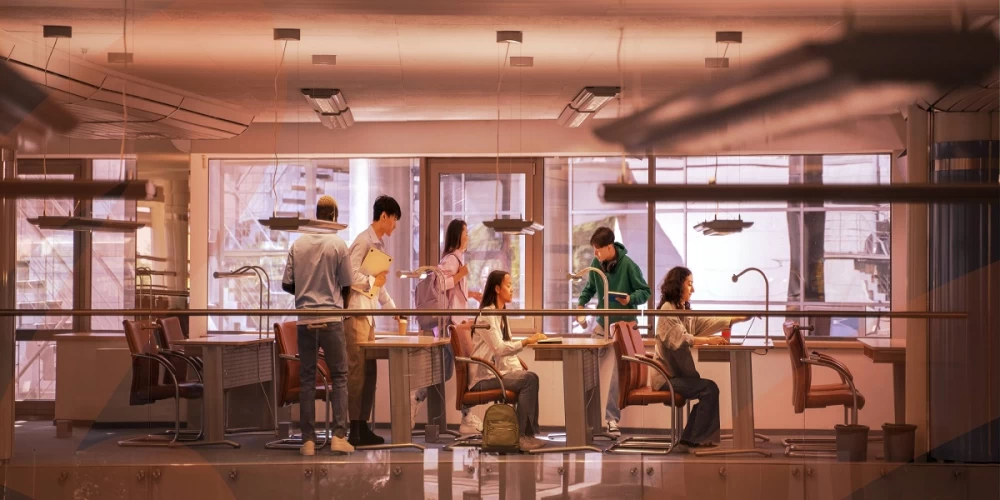Vastu for Commercial Office Buildings: Things to Keep In Mind

Though not discussed as much as residential, the commercial sector in the real estate industry has witnessed exponential advancement over the years. Not expected to slow down anytime soon, the business properties could surge to a 13% growth rate between 2023-27. The Delhi-NCR region continues to lead the market, with office rentals expected to go up by a significant 22-25% this year, a surprising statistic, given the work-from-home culture post-pandemic.
While more expensive to lease or purchase, commercial properties offer a higher ROI, divided into four primary categories: office space, industrial use, multi-family rental, and retail space. As the demand for commercial real estate continues to grow, you can expect many players to pour in the capital, leading us to wonder how to make the perfect investment. Factors like budget, location, connectivity, and bank loan play a role. However, this blog will discuss the importance of a relatively less spoken about but equally contributing factor Vastu for commercial buildings, with the key driver being office spaces.
Office Vastu is a system of architectural principles believed to create harmony and balance in the workplace, leading to increased productivity, efficiency, and prosperity. According to this ancient Indian practice, the layout, design, and orientation of an office space can significantly impact the success of a business, the well-being of its employees, and the satisfaction of its customers. By following Vastu guidelines, office owners and managers can optimise their workspace to promote positivity, creativity, and success.
In this introduction, we will explore the basics of Office Vastu and how it can be applied to modern workplaces.
1. Vastu direction for your office
As they say, Lord Kuber (God of wealth) sits in the north direction. Therefore, to increase the flow of income, ensure that your commercial property faces northeast, north, or northwest direction.
2. The direction of the office entrance
The office's entrance should be in the north or east direction as it is said to bring good fortune and positivity to the business. The east side represents the rising sun, which is a contributing factor for future growth. Ensure there are no obstructions or barriers at the entry path and that it doesn’t open into a wall.
3. Reception area as per Vastu
The reception area forms the first sight of the office place, creating the first impression, whether it be for a client, employee, or any other outside party. Thus, the reception must portray a powerful image of the company and give a positive and comfortable vibe, making the east or northeast direction the perfect site for construction. Decorating with flowers and offering sweets to visitors helps form a favourable image of the firm.
4. Office staircase
Preferably, staircases in the offices should be in the south or southwest direction and painted with light colours, avoiding shades of red and black. At the time of construction, the owner should make certain the flight of steps do not cover the center of the office, as it leads to financial losses.
5. Washroom
During construction, try allocating the west or northwest direction for the washrooms. Don’t forget to keep the restroom clean and hygienic.
6. Pantry
Given the number of hours a workforce spends in an office, there is a need for a quick and efficient pantry to keep them energised. Vastu experts suggest that the pantry should be in the southeast direction while avoiding the north side. Using red and pink shades for paint and placing plants are other creative ways to enhance the outlook.
7. Office colours as per Vastu
The use of colours is an essential element when designing the office. Hence you must consult Vastu experts before, with blue, green, and white being the preferred choices. Keep away from dark colours as they cause negative feelings among the employees.
8. Seating arrangement as per Vastu
- The owner should be seated towards the north or east direction.
- The manager should be facing southwest, south, or west directions
- Employees should be seated in the north or east as it increases their productivity.
Conclusion
When it comes to commercial buildings, following Vastu principles can enhance positive energy flow and help create a more productive and successful workspace. Some key considerations for Vastu in commercial buildings include the location of the main entrance, placement of the office, use of colours and materials, and the positioning of furniture and equipment.
By following Vastu principles, businesses can potentially benefit from increased success, better relationships with clients and employees, and a more positive work environment. However, it's important to note that Vastu is just one approach to building design, and there is no guarantee of success. Ultimately, it's up to each individual business to decide whether or not to incorporate Vastu principles into their commercial building design.
Thus owners looking to have their own office should consider the above points discussed, as a positive workforce equals positive results.
Get in Touch
Let our experts help you answer your questions
Get in Touch
Let our experts help you answer your questions


